Advance Financial Accounting: Exploring the Effects of IFRS Adoption
VerifiedAdded on 2023/06/11
|5
|767
|398
Essay
AI Summary
This essay discusses the impact of International Financial Reporting Standards (IFRS) adoption on business entities, highlighting both advantages and disadvantages. While IFRS aims to improve the quality of financial reports and provide reliable information to stakeholders, some argue that it leads to unnecessary disclosures, increasing complexity and costs. The essay examines how qualitative characteristics such as relevance, faithful representation, understandability, and timeliness are affected by IFRS, potentially distorting information and complicating financial statement interpretation. Despite the challenges, the essay acknowledges the benefits of IFRS adoption, emphasizing the need for companies to cope with both the pros and cons. Desklib provides students with access to similar solved assignments and resources.
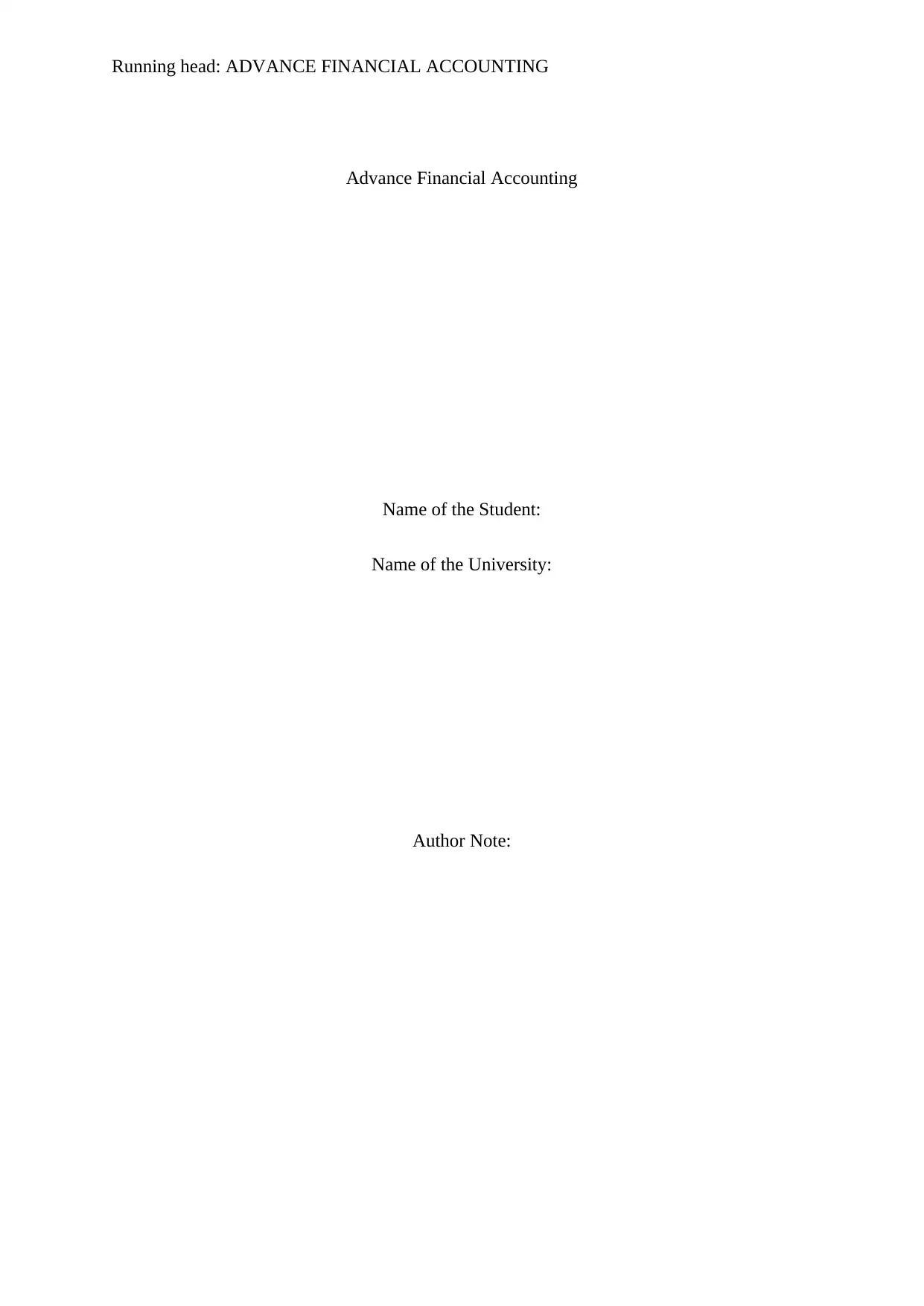
Running head: ADVANCE FINANCIAL ACCOUNTING
Advance Financial Accounting
Name of the Student:
Name of the University:
Author Note:
Advance Financial Accounting
Name of the Student:
Name of the University:
Author Note:
Paraphrase This Document
Need a fresh take? Get an instant paraphrase of this document with our AI Paraphraser
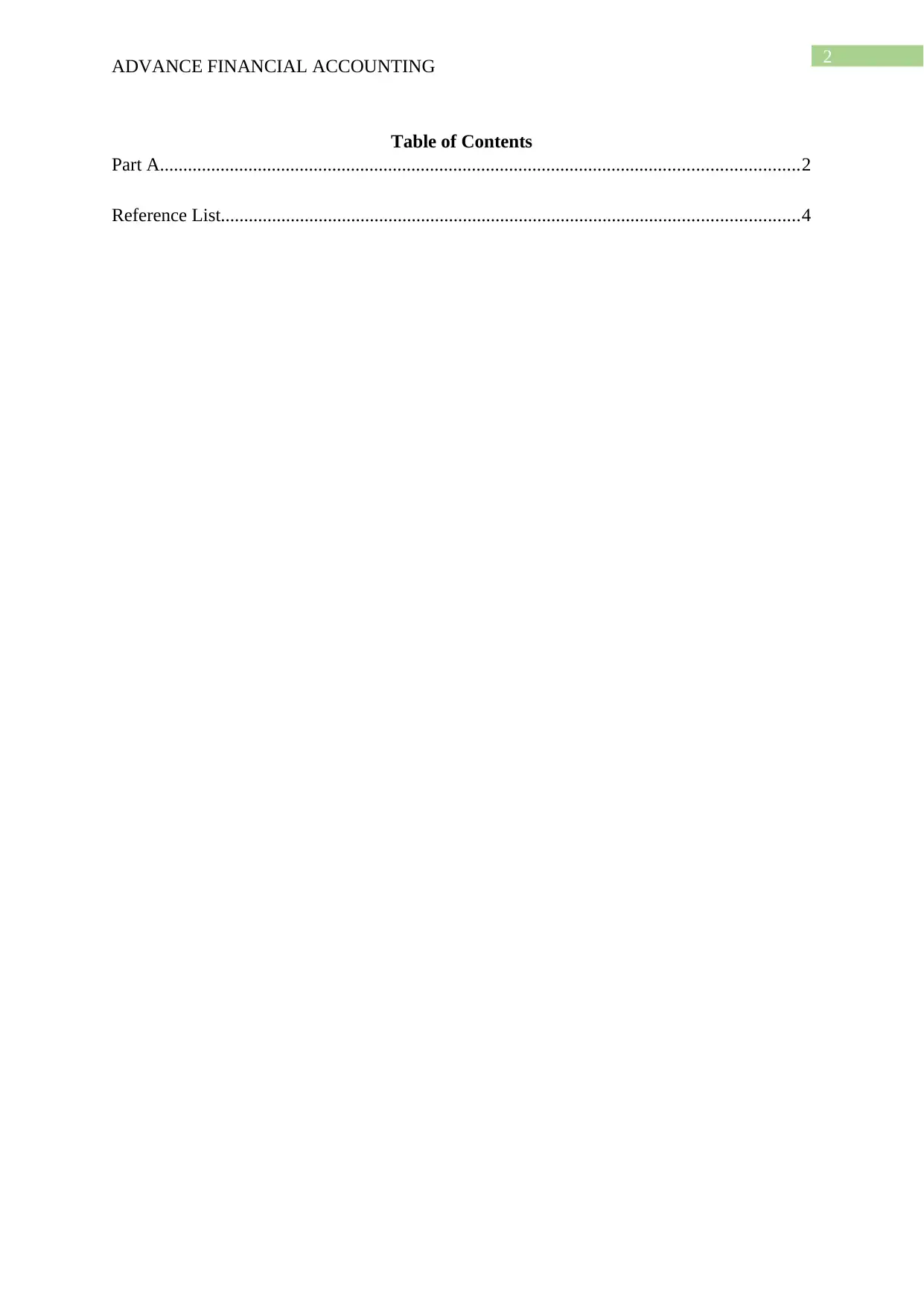
2
ADVANCE FINANCIAL ACCOUNTING
Table of Contents
Part A.........................................................................................................................................2
Reference List............................................................................................................................4
ADVANCE FINANCIAL ACCOUNTING
Table of Contents
Part A.........................................................................................................................................2
Reference List............................................................................................................................4
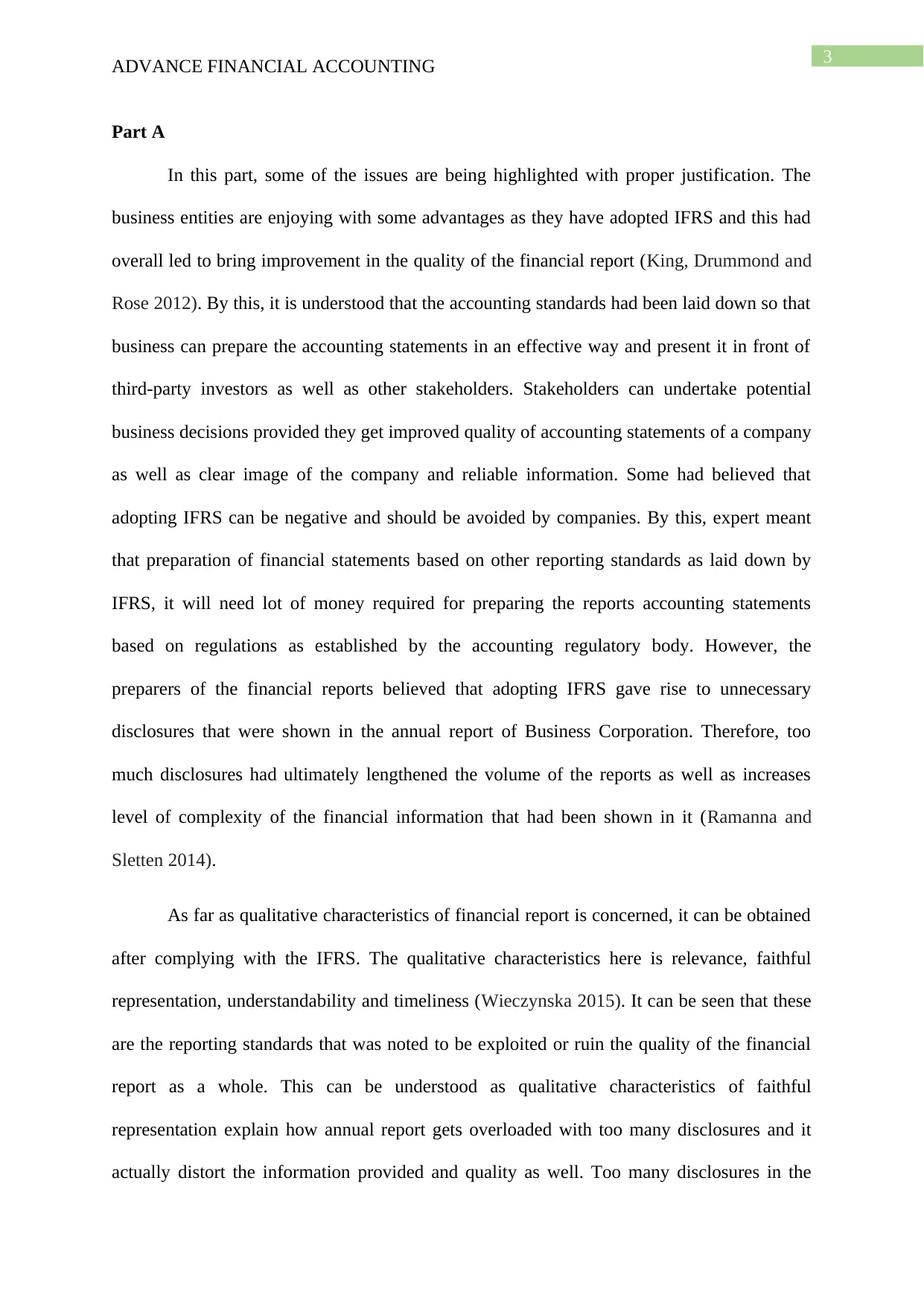
3
ADVANCE FINANCIAL ACCOUNTING
Part A
In this part, some of the issues are being highlighted with proper justification. The
business entities are enjoying with some advantages as they have adopted IFRS and this had
overall led to bring improvement in the quality of the financial report (King, Drummond and
Rose 2012). By this, it is understood that the accounting standards had been laid down so that
business can prepare the accounting statements in an effective way and present it in front of
third-party investors as well as other stakeholders. Stakeholders can undertake potential
business decisions provided they get improved quality of accounting statements of a company
as well as clear image of the company and reliable information. Some had believed that
adopting IFRS can be negative and should be avoided by companies. By this, expert meant
that preparation of financial statements based on other reporting standards as laid down by
IFRS, it will need lot of money required for preparing the reports accounting statements
based on regulations as established by the accounting regulatory body. However, the
preparers of the financial reports believed that adopting IFRS gave rise to unnecessary
disclosures that were shown in the annual report of Business Corporation. Therefore, too
much disclosures had ultimately lengthened the volume of the reports as well as increases
level of complexity of the financial information that had been shown in it (Ramanna and
Sletten 2014).
As far as qualitative characteristics of financial report is concerned, it can be obtained
after complying with the IFRS. The qualitative characteristics here is relevance, faithful
representation, understandability and timeliness (Wieczynska 2015). It can be seen that these
are the reporting standards that was noted to be exploited or ruin the quality of the financial
report as a whole. This can be understood as qualitative characteristics of faithful
representation explain how annual report gets overloaded with too many disclosures and it
actually distort the information provided and quality as well. Too many disclosures in the
ADVANCE FINANCIAL ACCOUNTING
Part A
In this part, some of the issues are being highlighted with proper justification. The
business entities are enjoying with some advantages as they have adopted IFRS and this had
overall led to bring improvement in the quality of the financial report (King, Drummond and
Rose 2012). By this, it is understood that the accounting standards had been laid down so that
business can prepare the accounting statements in an effective way and present it in front of
third-party investors as well as other stakeholders. Stakeholders can undertake potential
business decisions provided they get improved quality of accounting statements of a company
as well as clear image of the company and reliable information. Some had believed that
adopting IFRS can be negative and should be avoided by companies. By this, expert meant
that preparation of financial statements based on other reporting standards as laid down by
IFRS, it will need lot of money required for preparing the reports accounting statements
based on regulations as established by the accounting regulatory body. However, the
preparers of the financial reports believed that adopting IFRS gave rise to unnecessary
disclosures that were shown in the annual report of Business Corporation. Therefore, too
much disclosures had ultimately lengthened the volume of the reports as well as increases
level of complexity of the financial information that had been shown in it (Ramanna and
Sletten 2014).
As far as qualitative characteristics of financial report is concerned, it can be obtained
after complying with the IFRS. The qualitative characteristics here is relevance, faithful
representation, understandability and timeliness (Wieczynska 2015). It can be seen that these
are the reporting standards that was noted to be exploited or ruin the quality of the financial
report as a whole. This can be understood as qualitative characteristics of faithful
representation explain how annual report gets overloaded with too many disclosures and it
actually distort the information provided and quality as well. Too many disclosures in the
⊘ This is a preview!⊘
Do you want full access?
Subscribe today to unlock all pages.

Trusted by 1+ million students worldwide
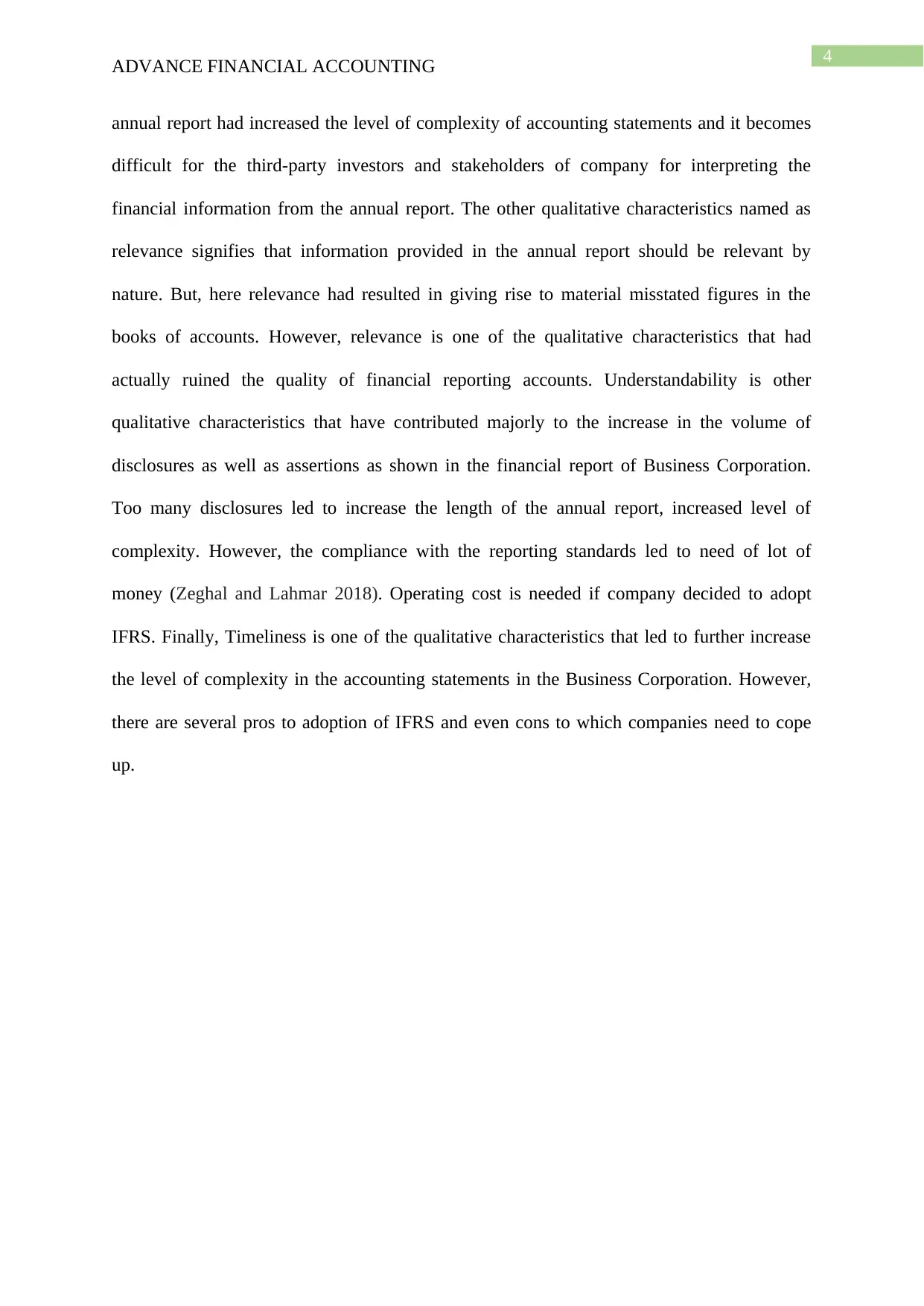
4
ADVANCE FINANCIAL ACCOUNTING
annual report had increased the level of complexity of accounting statements and it becomes
difficult for the third-party investors and stakeholders of company for interpreting the
financial information from the annual report. The other qualitative characteristics named as
relevance signifies that information provided in the annual report should be relevant by
nature. But, here relevance had resulted in giving rise to material misstated figures in the
books of accounts. However, relevance is one of the qualitative characteristics that had
actually ruined the quality of financial reporting accounts. Understandability is other
qualitative characteristics that have contributed majorly to the increase in the volume of
disclosures as well as assertions as shown in the financial report of Business Corporation.
Too many disclosures led to increase the length of the annual report, increased level of
complexity. However, the compliance with the reporting standards led to need of lot of
money (Zeghal and Lahmar 2018). Operating cost is needed if company decided to adopt
IFRS. Finally, Timeliness is one of the qualitative characteristics that led to further increase
the level of complexity in the accounting statements in the Business Corporation. However,
there are several pros to adoption of IFRS and even cons to which companies need to cope
up.
ADVANCE FINANCIAL ACCOUNTING
annual report had increased the level of complexity of accounting statements and it becomes
difficult for the third-party investors and stakeholders of company for interpreting the
financial information from the annual report. The other qualitative characteristics named as
relevance signifies that information provided in the annual report should be relevant by
nature. But, here relevance had resulted in giving rise to material misstated figures in the
books of accounts. However, relevance is one of the qualitative characteristics that had
actually ruined the quality of financial reporting accounts. Understandability is other
qualitative characteristics that have contributed majorly to the increase in the volume of
disclosures as well as assertions as shown in the financial report of Business Corporation.
Too many disclosures led to increase the length of the annual report, increased level of
complexity. However, the compliance with the reporting standards led to need of lot of
money (Zeghal and Lahmar 2018). Operating cost is needed if company decided to adopt
IFRS. Finally, Timeliness is one of the qualitative characteristics that led to further increase
the level of complexity in the accounting statements in the Business Corporation. However,
there are several pros to adoption of IFRS and even cons to which companies need to cope
up.
Paraphrase This Document
Need a fresh take? Get an instant paraphrase of this document with our AI Paraphraser
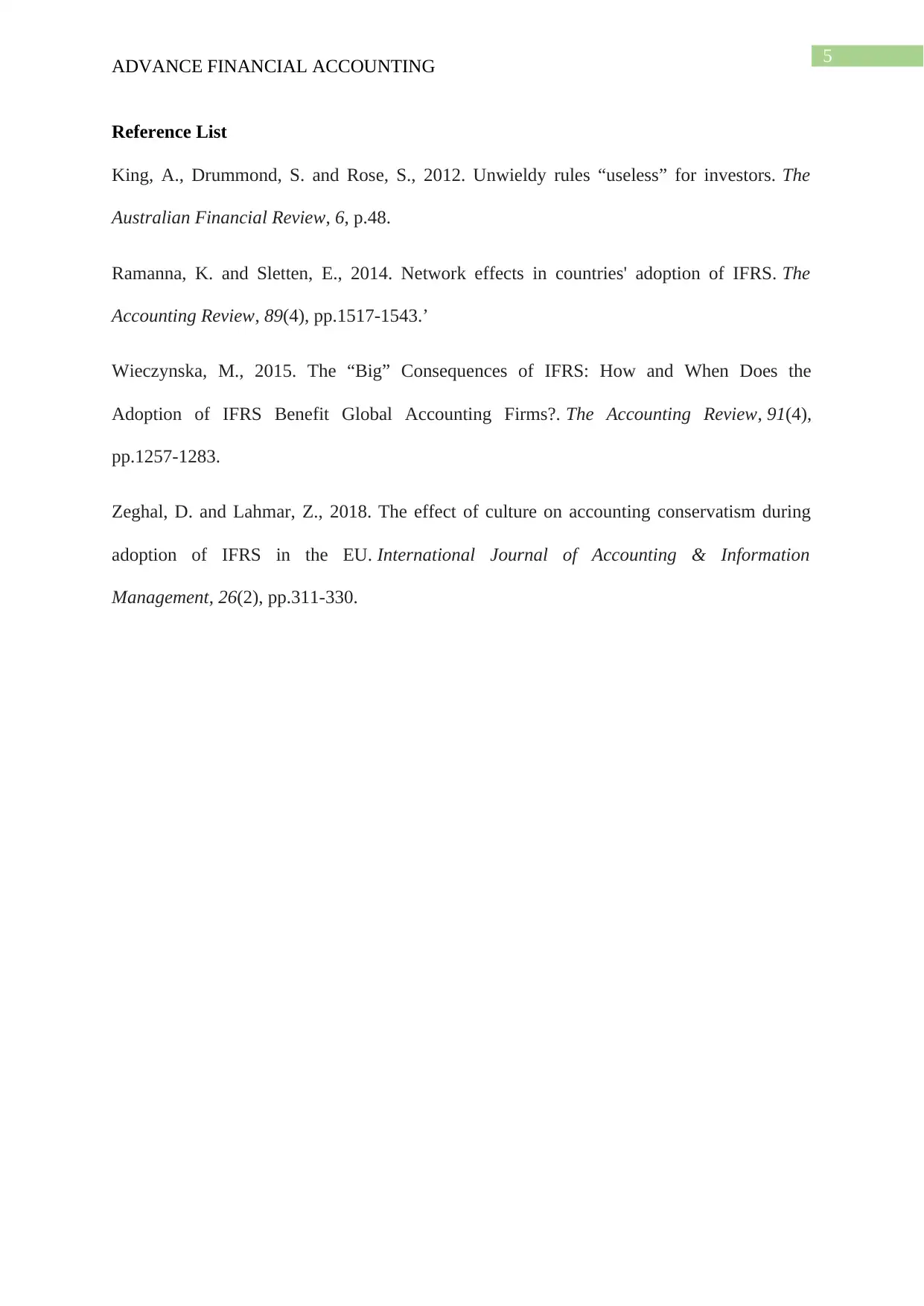
5
ADVANCE FINANCIAL ACCOUNTING
Reference List
King, A., Drummond, S. and Rose, S., 2012. Unwieldy rules “useless” for investors. The
Australian Financial Review, 6, p.48.
Ramanna, K. and Sletten, E., 2014. Network effects in countries' adoption of IFRS. The
Accounting Review, 89(4), pp.1517-1543.’
Wieczynska, M., 2015. The “Big” Consequences of IFRS: How and When Does the
Adoption of IFRS Benefit Global Accounting Firms?. The Accounting Review, 91(4),
pp.1257-1283.
Zeghal, D. and Lahmar, Z., 2018. The effect of culture on accounting conservatism during
adoption of IFRS in the EU. International Journal of Accounting & Information
Management, 26(2), pp.311-330.
ADVANCE FINANCIAL ACCOUNTING
Reference List
King, A., Drummond, S. and Rose, S., 2012. Unwieldy rules “useless” for investors. The
Australian Financial Review, 6, p.48.
Ramanna, K. and Sletten, E., 2014. Network effects in countries' adoption of IFRS. The
Accounting Review, 89(4), pp.1517-1543.’
Wieczynska, M., 2015. The “Big” Consequences of IFRS: How and When Does the
Adoption of IFRS Benefit Global Accounting Firms?. The Accounting Review, 91(4),
pp.1257-1283.
Zeghal, D. and Lahmar, Z., 2018. The effect of culture on accounting conservatism during
adoption of IFRS in the EU. International Journal of Accounting & Information
Management, 26(2), pp.311-330.
1 out of 5
Related Documents
Your All-in-One AI-Powered Toolkit for Academic Success.
+13062052269
info@desklib.com
Available 24*7 on WhatsApp / Email
![[object Object]](/_next/static/media/star-bottom.7253800d.svg)
Unlock your academic potential
Copyright © 2020–2026 A2Z Services. All Rights Reserved. Developed and managed by ZUCOL.

